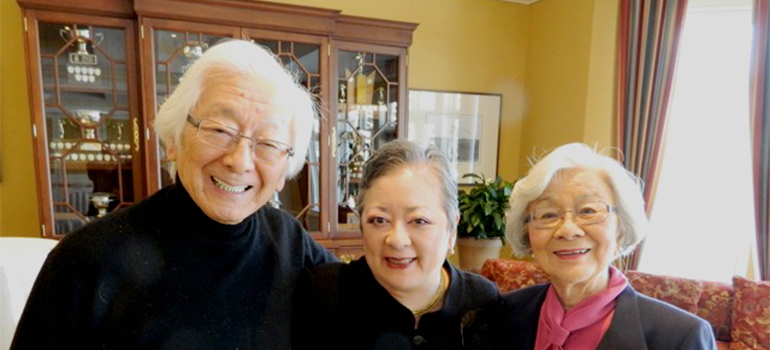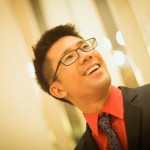September 18, 2014 – by Heather Amos
An 87-year-old Canadian doctor of Japanese ancestry is the first student in a new UBC program on Asian Canadian studies
It’s always disappointing when you don’t get into your university of choice, but Henry Sugiyama’s rejection from the University of British Columbia 69 years ago was particularly painful.
Sugiyama, then a Kamloops high school student, was more than qualified. He’d even won an entrance scholarship to the university based on academic merit. But the year was 1945 and the War Measures Act still forbid Canadians of Japanese ancestry like himself from living on Canada’s West Coast.
“The Second World War ended that summer and I was no longer an ‘enemy of the state.’ There was no real reason why UBC couldn’t take me,” he says.
Now he is getting his chance. The 87-year-old retired Toronto doctor is the first student to be admitted to a new UBC program that aims to tell the oft-neglected stories of Asian Canadians.
This fall the Faculty of Arts launched a new minor in Asian Canadian and Asian Migrations Studies. The program was created as part of a tribute to Japanese Canadians who were forced to leave the West Coast during the Second World War, including UBC students who were unable to complete their studies.
The new program was first announced in 2012, the year UBC formally recognized this injustice and bestowed honorary degrees on 76 Japanese Canadian students that were affected by forced removal from the West Coast during the war. More info here.
“We’ve come a long way from being a university that stood by while its own students were forcibly removed from their homes, to establishing a program that focuses on the crucial role of Asian migrants in the formation of our province and nation,” says Prof. Chris Lee, director of the new program.
‘The lowest time in my life’
More than 21,000 Japanese Canadians were forced to leave their homes on the West Coast in 1942 when Prime Minister William Lyon Mackenzie King invoked the War Measures Act following the attack on Pearl Harbour.
At the time, Sugiyama was 14 years old and a student at Templeton Junior High in East Vancouver. He and his three brothers were all born in Canada and both his parents had been granted Canadian citizenship. When they were exiled, his father – a successful Vancouver businessman – lost everything he had worked hard to earn since his arrival in Canada in 1912.
“We were uprooted; I lost all my friends,” he says, remembering the day in May 1942 when he and his family were forced to board a train to B.C.’s interior. “No one came to see us off. It was the lowest time in my life.”
The family settled in Kamloops, B.C. where Sugiyama completed high school. Always a strong student, he was encouraged by his teachers to write the University Entrance Scholarship exams. He won a prized scholarship to UBC, but his admission was rejected because Japanese Canadians were not allowed on the coast, a ban that lasted until 1949.
The new Asian Canadian and Asian Migration Studies program
“Canada has changed a great deal over the last 100 years,” says Prof. Henry Yu, who teaches history at UBC. “Until 1949, anti-Asian legislation deprived Chinese Canadians, Japanese Canadians, and Indo-Canadians of the vote, and prevented them from working in many jobs and living in some neighbourhoods. Until 1967, Canada’s immigration policy excluded Asians.”
“One of the important lessons students grapple with in the new program is the question of how a racist society was both built and then remade, and who struggled to make Canada a more just society.”
The minor, created with the involvement of different Asian Canadian communities, gives students a chance to explore the rich history of Asians in Canada. It includes courses from a variety of fields such as geography, history, sociology, literature, and fine arts, as well as a course where students create short documentaries that put Asian Canadian issues in the spotlight.
Carolyn Nakagawa is an English Honours student in the Asian Canadian and Asian Migration Studies program and she’ll be meeting Sugiyama in person on September 23 when he, at the invitation of President Arvind Gupta, travels to UBC from his home in Toronto to attend a symbolic first day of class.
“Readings and texts become tools to engage with the community and with lived experiences,” says Nakagawa. “People like Dr. Sugiyama are at the centre of the learning we’re doing.”
From enemy alien to Order of Canada
Since UBC wasn’t an option, Sugiyama attended the University of Manitoba and graduated from its medical school in 1952. He moved to Toronto, started a successful practice and raised a family. This past July, Sugiyama’s daughter Constance was appointed a member of the Order of Canada for her work as a lawyer and involvement in the community, particularly her deep contributions to the Japanese Canadian community.
To Henry Sugiyama, this honour symbolizes the ultimate achievement for his family: going from enemy alien to recipient of the country’s highest civilian honour in one generation. He knows his late father would be proud.
“My father never gave up his love for this country and never gave up hope that his family would succeed and make a better country.”
New program and a new way of learning
The new Asian Canadian and Asian Migration Studies is not just a history program. With courses drawn across the humanities, fine arts, and social sciences, it empowers students to become storytellers and teachers. Last year, a new course in film production asked students to use video to highlight under-reported stories – from the past or present – of Asian Canadians
Joanna Yang, a recent graduate who took the course, and master’s student Stephanie Fung created a short documentary on queer Asian Canadian youth that will be shown at film festivals in Montreal and Torino this coming year. Yang says that “learning by doing” has been life-changing.
“We are harnessing the power of new media to preserve, create, and spread knowledge and to tell stories that have often been ignored,” she says.
Students also created short films on topics such as Canada’s first tofu company, playing hockey in Asia and how Filipino international students stay connected to home. Students worked with community members across cultures, and used media to communicate important topics. As part of UBC’s more flexible approach to learning, the program aims to create a better experience for student learning and engagement.
“The Asian Canadian and Asian Migration Studies Program aims to give students skills that will enable them to impact their communities long after they graduate from UBC,” says Chris Lee. “We hope it’s a fitting way to honour older generations who suffered from racial discrimination.”
Originally Posted at: http://news.ubc.ca/2014/09/18/an-acceptance-letter-69-years-late/
 Faculty of Art
Faculty of Art


